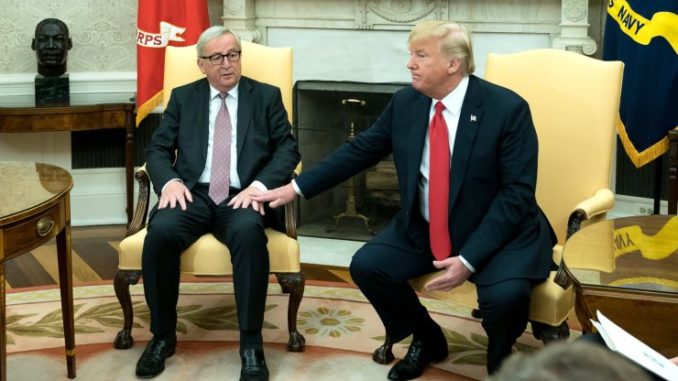
Washington and Brussels have been at odds over trade since President Donald Trump was elected in 2016 and ended trade negotiations between both sides of the Atlantic. Trump has said that Europe is “possibly just as bad as China” when it comes to trade and called it a “brutal” trading partner.
However, despite U.S. threats over new tariffs on Europe and the latter’s willingness to retaliate, analysts are not expecting a trade war between the economic giants for several reasons.
“For us, a trade war requires trade as a share of GDP (gross domestic product) to decline,” Ricardo Garcia, chief euro zone economist at UBS, told CNBC Tuesday, adding a “low probability” to this scenario.
“We think the EU would be in a much better position to retaliate than China and is prepared to do so in a highly targeted fashion ahead of the U.S. presidential elections in 2020,” he said.
Trump shook the European Union last year when he decided to slap tariffs on European steel and aluminium. Brussels retaliated immediately, putting duties on denim, peanut butter and other American goods. The EU also took the case to the World Trade Organization (WTO).

Donald J. Trump✔@realDonaldTrump
Too bad that the European Union is being so tough on the United Kingdom and Brexit. The E.U. is likewise a brutal trading partner with the United States, which will change. Sometimes in life you have to let people breathe before it all comes back to bite you!109K5:52 AM – Apr 11, 2019Twitter Ads info and privacy43.5K people are talking about this
To bridge their differences and, above all, prevent further duties on EU goods, European Commission President Jean-Claude Juncker traveled to Washington a couple of months later. He agreed with President Trump to work together to bring existing tariffs towards zero on non-auto industrial goods; to buy more liquefied natural gas from the U.S. and to find ways to bring their standards closer together.
On Monday, the 28 European countries finally adopted a common position to negotiate trade with the U.S. The EU wants a deal “strictly focused on industrial goods,” thus excluding agricultural products – a proposal that President Trump does not like.
“They barely take our agricultural products, and yet they can sell Mercedes Benz and they can sell anything they want in our country including their farm products, and it’s not fair,” Trump said Monday, threatening to impose tariffs on European carmakers if the EU does not expand its negotiating remit.

WATCH NOWVIDEO01:49Juncker: We made a deal today, will hold off on further tariffs
Holger Schmieding, chief economist at Berenberg, said Tuesday in a research note that there will be “noisy discussions” between Europe and the U.S.
“Nonetheless we do not expect an escalating dispute that could sow uncertainty and hurt global industry as much as the U.S.-Chinese trade war has done in the last three quarters,” he added.
Trump has challenged China over trade since taking power as well, imposing increasing rounds of tariffs on the country. At the moment, however, media reports and comments from the U.S. and Chinese administrations suggest they could be close to a trade agreement.
According to Schmieding, a deal between Beijing and Washington would make an agreement with Brussels even more likely. “After all, the EU is no geostrategic rival of the U.S.,” he said.
Both analysts are also confident that the U.S. and Europe will avoid a trade war because political support in the United States for a trade war with the EU is much weaker than backing for a tough stance on China.
“The final result (of trade talks between the EU and U.S.) remains unclear. In the end, we may even get neither a deal nor a trade war,” Schmieding said.
BY CNBC NEWS
